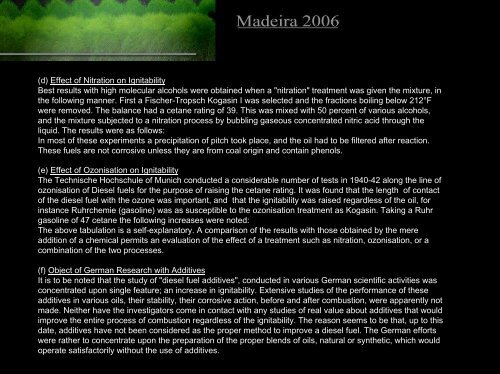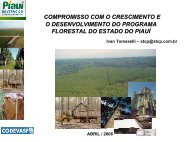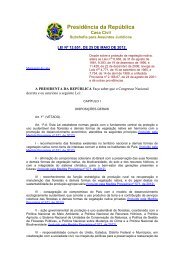Syngas - Associação Brasileira de Produtores de Florestas Plantadas
Syngas - Associação Brasileira de Produtores de Florestas Plantadas
Syngas - Associação Brasileira de Produtores de Florestas Plantadas
- No tags were found...
Create successful ePaper yourself
Turn your PDF publications into a flip-book with our unique Google optimized e-Paper software.
(d) Effect of Nitration on IgnitabilityBest results with high molecular alcohols were obtained when a "nitration" treatment was given the mixture, inthe following manner. First a Fischer-Tropsch Kogasin I was selected and the fractions boiling below 212°Fwere removed. The balance had a cetane rating of 39. This was mixed with 50 percent of various alcohols,and the mixture subjected to a nitration process by bubbling gaseous concentrated nitric acid through theliquid. The results were as follows:In most of these experiments a precipitation of pitch took place, and the oil had to be filtered after reaction.These fuels are not corrosive unless they are from coal origin and contain phenols.(e) Effect of Ozonisation on IgnitabilityThe Technische Hochschule of Munich conducted a consi<strong>de</strong>rable number of tests in 1940-42 along the line ofozonisation of Diesel fuels for the purpose of raising the cetane rating. It was found that the length of contactof the diesel fuel with the ozone was important, and that the ignitability was raised regardless of the oil, forinstance Ruhrchemie (gasoline) was as susceptible to the ozonisation treatment as Kogasin. Taking a Ruhrgasoline of 47 cetane the following increases were noted:The above tabulation is a self-explanatory. A comparison of the results with those obtained by the mereaddition of a chemical permits an evaluation of the effect of a treatment such as nitration, ozonisation, or acombination of the two processes.(f) Object of German Research with AdditivesIt is to be noted that the study of "diesel fuel additives", conducted in various German scientific activities wasconcentrated upon single feature; an increase in ignitability. Extensive studies of the performance of theseadditives in various oils, their stability, their corrosive action, before and after combustion, were apparently notma<strong>de</strong>. Neither have the investigators come in contact with any studies of real value about additives that wouldimprove the entire process of combustion regardless of the ignitability. The reason seems to be that, up to thisdate, additives have not been consi<strong>de</strong>red as the proper method to improve a diesel fuel. The German effortswere rather to concentrate upon the preparation of the proper blends of oils, natural or synthetic, which wouldoperate satisfactorily without the use of additives.
















